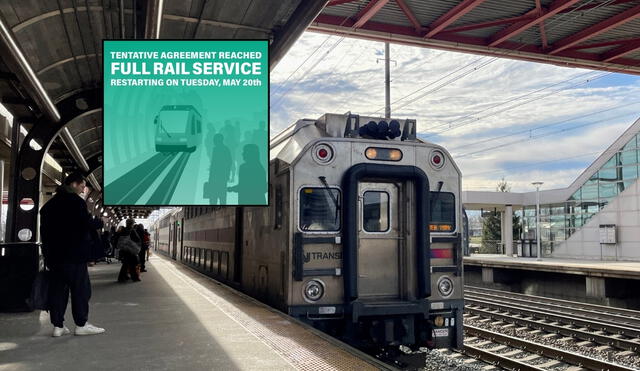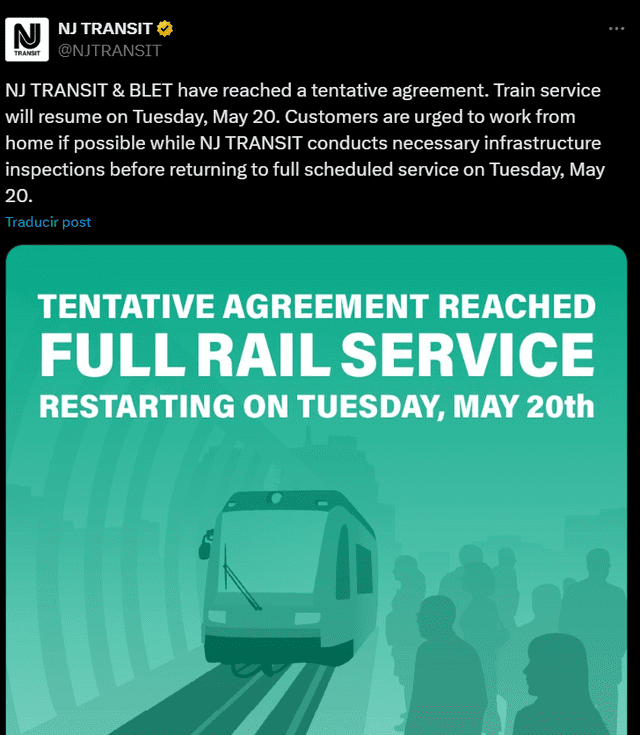NJ Transit reaches deal to end strike; Full service resumes Tuesday
After three days of halted trains and frustrated commuters, NJ Transit and union leaders reach a breakthrough deal — promising smoother rides ahead and spotlighting the power of labor negotiations in keeping the state moving.

The NJ transit strike, which commencing on May 16, was resolved three days later when the Brotherhood of Locomotive Engineers and Trainmen (BLET) and NJ transit reached an agreement today. This was the first major New Jersey transit strike in more than 40 years, which interrupted the traffic of nearly 350,000 daily passengers. NJ Transit had proposed to raise the average salary of engineers from $135,000 to $172,000, while the union disagreed and provided documentation to support their claims that the average wage for the engineers was approximately $113,000 and wanted to achieve parity with their peers at Amtrak and the Long Island Railroad.
New Jersey Governor Phil Murphy blasted the strike as a "slap in the face" for commuters. Yet, truces are not anything new, and both sides agreed to resume negotiations, with the National Mediation Board mediating the talks. Union leaders were hopeful an equitable agreement could be made, and confirmed the union's goal was to secure a deal that reflected the worth of the value of their work. NJ Transit President and CEO Kris Kolluri stated the negotiations were construction talks, in hopes of getting reliable service back in the communities.

ALSO SEE: Trump Administration seeks deployment of 20,000 National Guard Troops for Immigration enforcement
NJ Transit Strike exposes labor issues and operator pay needs
NJ Transit put contingency plans in place during the strike, utilizing extra bus resources to accommodate some commuters. However, these available resources could provide service for only a fraction of the rail passengers who would typically rely on NJ Transit. During the strike, covered persons were advised to utilize the work-from-home option offered by many firms, or to utilize other forms of transportation. The strike made it clear to transit users about the importance of locomotive engineers in conducting daily waterfront transit, and that when labor relations break down, public infrastructure and transit becomes a consideration.
While the strike ended in an agreement with both sides conceding something, the details of the settlement were not disclosed. The union learned that it achieved its aim of opening wage discussions with NJ Transit, was able to avert having to deal with a longer disruption for passengers. The incident underscored the necessity for labor unions and transit administrations to engage in constant communication to avoid documented longer service interruptions. Moreover, the incident brought attention to the need for competitive compensation for the retention of skilled operators in public transportation.
NJ Transit Post-Strike recovery: Labor relations and service restoration insights
As services begin to return, commuters should be prepared for the slow return to full service levels. NJ Transit is working to bring back its staff so they can operate in a safe manner. The agency has made it clear that they will provide updates as quickly as possible to the public. While the end of a strike is welcomed by many, it also serves as an reminder of the precarious balance between labor relations and public service commitment.

NJ Transit announces tentative deal with BLET; train service set to resume Tuesday, May 20, pending safety inspections. Commuters advised to plan accordingly. Photo: NJ Transit X account
Moving forward, NJ Transit aims to build a more collaborative working relationship with the BLET to help address emerging challenges, and both sides see that mutual respect and understanding are critical to ensuring a well-functioning and efficient transit system. The strike has demonstrated important lessons about labor negotiations and how timely communication and appropriate compensation can help sustain vital public services.
NJ Transit Train schedule for May 20: First Departures to and from New York, Newark, Hoboken, and Atlantic City
NJ Transit Train Schedule for May 20: First Departures to and from New York, Newark, Hoboken, and Atlantic City:
To Newark / New York
- Northeast Corridor: 3806 (3:47 AM from Trenton)
- Princeton Dinky: 4106 (4:53 AM from Princeton)
- North Jersey Coast Line (Long Branch to NY): 3202 (3:58 AM from Long Branch)
- North Jersey Coast Line (Bay Head Shuttle): 4310 (4:46 AM from Bay Head)
- Raritan Valley Line: 5404 (4:29 AM from Raritan)
From New York / Newark
- 3809 (4:13 AM from NYC)
- 4105 (4:43 AM from Princeton Junction)
- 3209 (4:27 AM from NYC)
- 4315 (5:32 AM from Long Branch)
- 5409 (5:41 AM from NYC)
To Hoboken / New York
- Morristown Line: 6602 (4:10 AM from Dover)
- Gladstone Branch: 400 (4:27 AM from Gladstone)
- Montclair-Boonton Line (from MSU): 6200 (4:40 AM from MSU)
- Montclair-Boonton Line (from Hackettstown): 1070 (5:04 AM from Hackettstown)
- Main Line: 1100 (4:50 AM from Suffern)
- Bergen County Line: 42 (3:44 AM from Port Jervis)
- Port Jervis Line: 42 (3:44 AM from Port Jervis)
- Pascack Valley Line: 1602 (5:10 AM from Spring Valley)
From New York / Hoboken
- 301 (4:39 AM from Hoboken)
- 481 (6:59 AM from Hoboken)
- 6209 (5:53 AM from NYC)
- 871 (5:38 AM from Hoboken)
- 1103 (5:48 AM from Hoboken)
- 1245 (6:53 AM from Hoboken)
- 43 (8:25 AM from Hoboken)
- 1605 (8:56 AM from Hoboken)
To Atlantic City
- 4608 (4:11 AM from Atlantic City)
From Atlantic City
- 4613 (6:11 AM from Philadelphia)












